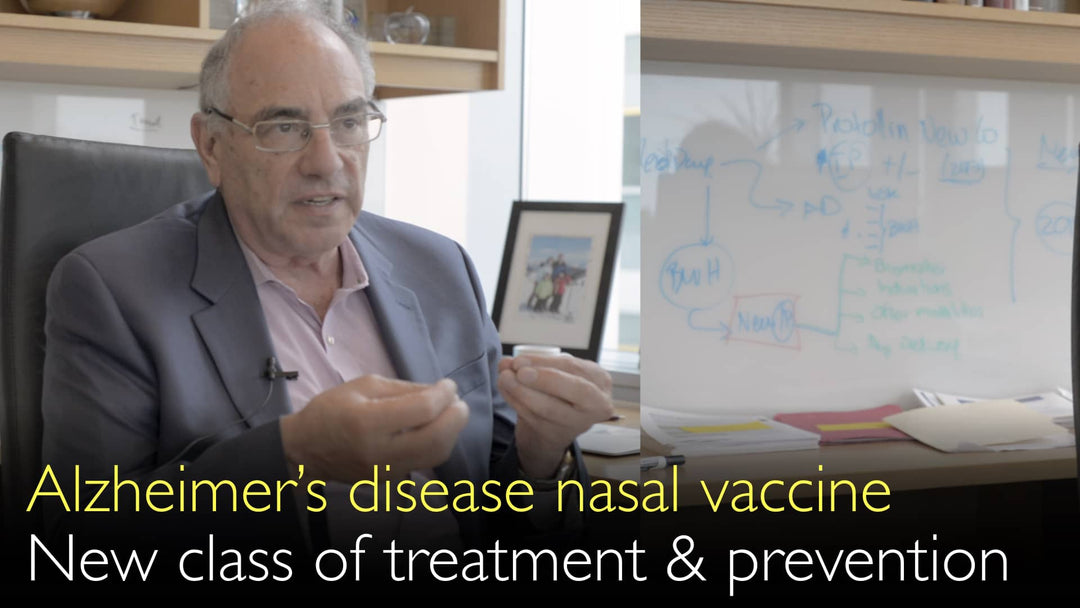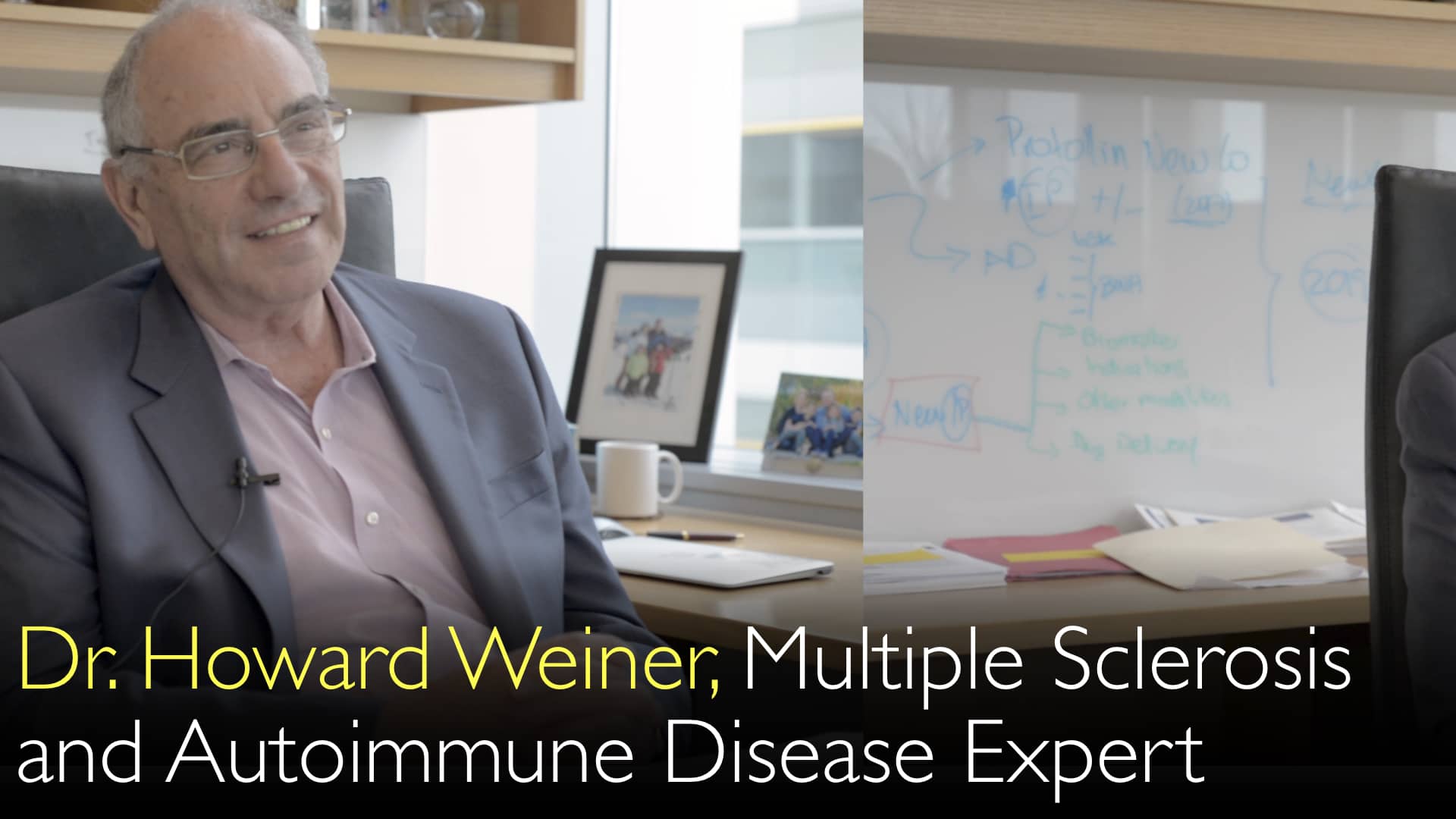면역학 및 신경퇴행성 질환 분야의 선도적 전문가인 Howard Weiner 박사(MD)가 비강 투여 백신이 알츠하이머병 예방에 기여할 수 있는 방안을 설명합니다. 그는 증상이 나타나기 전인 전임상 단계에서의 조기 개입이 매우 중요하다고 강조합니다. Weiner 박사는 아밀로이드-베타를 뇌에서 제거하는 데 도움을 주는 백신 치료법에 대한 진행 중인 연구를 상세히 소개하며, 조기 발견을 위한 망막 영상 기술과 예방 접종 전략을 결합한 접근법의 잠재력에 주목합니다.
알츠하이머 예방 비강 백신: 조기 치료의 새로운 지평
목차 바로가기
알츠하이머 예방 비강 백신
Howard Weiner 박사(의학박사)는 알츠하이머병 예방을 위해 고안된 새로운 비강 백신 개발을 주도하고 있습니다. 이 접근법은 증상 치료에서 기저 신경퇴행 과정 예방으로의 중대한 전환을 의미합니다. Weiner 박사의 연구는 다발성 경화증과 같은 자가면역질환에 대한 백신 치료법을 개발한 그의 풍부한 경험을 바탕으로 합니다.
알츠하이머 백신의 개념은 오랫동안 치매 연구의 최종 목표로 여겨져 왔습니다. Anton Titov 박사(의학박사)는 Weiner 박사와 함께 이 잠재력을 탐구하며 그 획기적인 의미를 강조합니다.
작용 기전: 아밀로이드-베타 제거
제안된 비강 백신은 면역 체계를 자극하여 뇌에서 아밀로이드-베타 단백질을 제거하도록 유도합니다. 아밀로이드-베타 플라크는 알츠하이머병의 대표적인 병리학적 특징입니다. 이 독성 단백질의 제거를 촉진함으로써 백신은 심각한 인지 저하가 발생하기 전에 질병 진행을 멈추거나 늦추는 것을 목표로 합니다.
Howard Weiner 박사(의학박사)와 그의 팀은 이미 이 백신 접근법에 대한 유망한 데이터를 발표했습니다. 그들의 연구는 인간 임상시험으로 진행하기 위한 탄탄한 과학적 기반을 제공합니다.
조기 치료의 중요성
Howard Weiner 박사(의학박사)가 논의한 핵심 주제는 모든 질병, 특히 알츠하이머병에서 치료 시기가 빠를수록 결과가 더 좋다는 점입니다. 현재 많은 임상시험들이 인지 기능은 정상이지만 고위험군에 속하는 개인들을 대상으로 치료하는 데 초점을 맞추고 있습니다. 이 예방 전략은 임상 증상이 나타날 때쯤이면 이미 심각하고 종종 비가역적인 뇌 손상이 발생했기 때문에 매우 중요합니다.
Anton Titov 박사(의학박사)는 백신 접종이 질병 발병 전에 필요한지, 아니면 초기 증상 이후에 필요한지 질문하며, 이러한 중재 시점을 결정하는 어려움을 강조합니다.
전임상기 알츠하이머 식별
예방 치료의 주요 장애물은 전임상 단계의 환자를 식별하는 것입니다. Howard Weiner 박사(의학박사)는 알츠하이머 병리가 시작되었지만 인지 기능이 정상인 개인들을 선별 검사하는 것이 고급 영상 기술을 통해 가능하다고 설명합니다. 그는 런던의 전문가들이 알츠하이머병의 첫 임상 증상이 나타나기 10년 이상 전에 망막 세포에서 신경퇴행 징후를 탐지하는 흥미로운 연구를 인용합니다.
이 조기 발견 방법은 잠재적으로 예방 백신과 결합되어 알츠하이머 치료에 혁신을 가져올 수 있습니다. 이는 치료가 가장 효과적일 가능성이 있는 시기에 중재할 수 있는 기회를 창출합니다.
향후 임상시험
알츠하이머 비강 백신에 대한 연구는 임상시험을 향해 활발히 진행되고 있습니다. Howard Weiner 박사(의학박사)는 이러한 시험이 곧 시작되어 인간에서 백신의 효능과 안전성을 검증하기를 희망합니다. 목표는 알츠하이머병의 전임상 단계를 위한 이 혁신적인 치료법을 입증하는 것입니다.
Anton Titov 박사(의학박사)와의 대화에서 자세히 설명된 이 연구는 알츠하이머 예방을 현실로 만들기 위한 중요한 움직임을 의미합니다. 이는 의학에서 가장 어려운 신경퇴행성 질환 중 하나에 대한 적극적인 접근법을 나타냅니다.
전체 대본
Anton Titov 박사(의학박사): 알츠하이머병 백신. 이것은 매우 흥미로운 주제입니다. 왜냐하면 알츠하이머병 치료는 여전히 치매 연구 및 치료의 최종 목표이기 때문입니다. 귀하는 알츠하이머병에 대한 백신 접종 가능성과 다발성 경화증에 대한 백신 접종을 연구해 오셨습니다. 신경퇴행성 및 자가면역 질환에 대한 백신의 잠재력에 대해 무엇을 말씀해 주시겠습니까?
Howard Weiner 박사(의학박사): 우리는 현재 알츠하이머병 연구를 진행 중입니다. 우리는 치매 예방 백신 접종 데이터를 발표했습니다. 우리는 알츠하이머병을 위한 비강 백신에 대한 임상시험을 곧 시작할 것으로 기대합니다. 백신은 뇌에서 아밀로이드-베타(a-beta)를 제거하는 데 도움을 줍니다.
우리는 알츠하이머병에 대한 백신 치료법을 활발히 연구 중입니다.
Anton Titov 박사(의학박사): 알츠하이머병 백신 작업은 현재 어느 정도 진행되었습니까? 그 잠재력은 무엇입니까? 환자들은 알츠하이머병이 시작되기 전에, 아니면 일부 유전자 검사를 바탕으로 초기 증상이 나타날 때 백신 접종이 필요할까요?
알츠하이머병이 언제 시작되는지 예측하는 것은 매우 어렵습니다. 아니면 환자들이 이미 알츠하이머병의 임상적 징후를 보일 때일까요?
Howard Weiner 박사(의학박사): 어떤 질환이든 치료 시기가 빠를수록 치료 결과가 더 좋습니다. 많은 알츠하이머병 임상시험들이 인지 기능이 정상인 환자들을 대상으로 치료하고 있습니다. 우리가 이야기하는 비강 백신은 알츠하이머병의 전임상 단계에서 가장 잘 작동할 것입니다.
현재는 정상이지만 알츠하이머병이 시작되고 있는 환자들을 선별 검사할 것입니다. 그것은 영상 촬영으로 측정 가능합니다.
흥미롭게도, 런던에서 녹내장 및 신경퇴행성 질환 전문가와 이야기했는데, 그들은 환자들이 알츠하이머병의 첫 증상, 즉 첫 임상 증상을 보이기 10~20년 전에 망막 세포에서 퇴행 징후를 식별하고 있습니다.
아마도 그것을 백신 접종과 결합할 수 있을 것입니다. 물론, 가능합니다. 신경퇴행을 예방하기 위한 백신으로 알츠하이머병을 조기 단계에서 치료하는 것은 현실이 되어 가고 있습니다.





